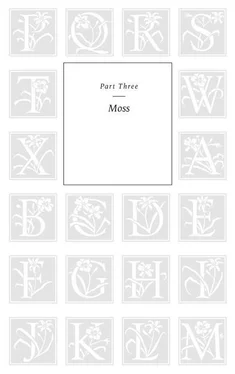Vanessa Diffenbaugh - The Language of Flowers
Здесь есть возможность читать онлайн «Vanessa Diffenbaugh - The Language of Flowers» весь текст электронной книги совершенно бесплатно (целиком полную версию без сокращений). В некоторых случаях можно слушать аудио, скачать через торрент в формате fb2 и присутствует краткое содержание. Жанр: Старинная литература, на английском языке. Описание произведения, (предисловие) а так же отзывы посетителей доступны на портале библиотеки ЛибКат.
- Название:The Language of Flowers
- Автор:
- Жанр:
- Год:неизвестен
- ISBN:нет данных
- Рейтинг книги:4 / 5. Голосов: 1
-
Избранное:Добавить в избранное
- Отзывы:
-
Ваша оценка:
- 80
- 1
- 2
- 3
- 4
- 5
The Language of Flowers: краткое содержание, описание и аннотация
Предлагаем к чтению аннотацию, описание, краткое содержание или предисловие (зависит от того, что написал сам автор книги «The Language of Flowers»). Если вы не нашли необходимую информацию о книге — напишите в комментариях, мы постараемся отыскать её.
The Language of Flowers — читать онлайн бесплатно полную книгу (весь текст) целиком
Ниже представлен текст книги, разбитый по страницам. Система сохранения места последней прочитанной страницы, позволяет с удобством читать онлайн бесплатно книгу «The Language of Flowers», без необходимости каждый раз заново искать на чём Вы остановились. Поставьте закладку, и сможете в любой момент перейти на страницу, на которой закончили чтение.
Интервал:
Закладка:
“A little more warning next time,” I told Renata as we drove to Bloom later that morning. We had a full week of weddings ahead of us, and we were both rested and well fed.
“If I had warned you,” Renata said, “you wouldn’t have come. And you needed a little rest and nutrition. Don’t try to tell me you didn’t.”
I didn’t argue.
“My mother’s a bit of a legend in the midwifery circle. She’s seen everything, and her outcomes are far better than the outcomes of modern medicine, even when they shouldn’t be. She’ll likely grow on you; she does on most people.”
“Most people,” I guessed, “but not you?”
“I respect my mother,” Renata said, pausing. “We’re just different. Everyone assumes there’s some kind of biological consistency between mothers and their children, but that’s not always the case. You don’t know my other sisters, but look at Natalya, my mother, and me.” She was right; the three couldn’t have been more different.
All day, as I organized orders and made lists of flowers and quantities for upcoming weddings, I thought about Grant’s mother. I remembered the pale hand reaching out of the darkness the afternoon Elizabeth and I visited. What had it been like to be Grant as a child? Alone except for the flowers, his mother slipping from the past to the present as she walked from room to room. I would ask Grant, I decided, if he would talk to me again.
But he wasn’t at the flower market that week, or the week after. His stall stood empty, the white plywood peeling and abandoned-looking. I wondered if he would come back, or if the thought of seeing me again was enough to keep him away permanently.
Consumed by thoughts of Grant’s absence, the quality of my work suffered. Renata began sitting beside me at the worktable, and instead of our usual silence, she told me long, humorous stories about her mother, her sisters, her nieces and nephews. I only half listened, but the constant narration was enough to keep me focused on the flowers.
The new year came and went, a flurry of white weddings and silver-bell-trimmed bouquets. Grant still had not returned to the flower market. Renata gave me the week off, and I holed up inside the blue room, coming out only to eat and to use the bathroom. Every time I emerged through my half-door, I came face-to-face with the orange photo box, and I was flooded with a vague sense of loss.
Renata had not requested my help until the following Sunday, but on Saturday afternoon there was a knock on my door. I poked my head out and saw Natalya, still in her pajamas, clearly annoyed.
“Renata called,” she said. “She needs you. She said to take a shower and come as fast as you can.”
Take a shower? It seemed like an odd request from Renata. She probably needed me to accompany her to a delivery, and rightly assumed I’d been asleep and unbathed for most of the week.
I took my time in the shower, soaping and shampooing and brushing my teeth with mouthfuls of water as hot as I could stand it. When I dried myself with a towel, my skin was red and splotchy. I put on my nicest outfit: black suit pants and a soft white blouse, the material sewn in tucks like an old-fashioned tuxedo shirt. Before leaving the bathroom, I trimmed my hair with precision and blow-dried the snips of hair off my shirt.
As I neared Bloom I saw a familiar figure sitting on the deserted curb, an open cardboard box in his lap. Grant. So that was why Renata had called. I stopped walking and took in his profile, serious and watchful. He turned in my direction and stood up.
We walked toward each other, our short steps matched, until we met in the middle of the steep hill, Grant looming above me. We were far enough apart that I couldn’t see the contents of the box, which he held below his chin.
“You look nice,” he said.
“Thank you.” I would have returned the compliment, except he didn’t. He had been working all morning; I could tell by the dirt on his knees and the fresh mud on his boots. He smelled, too, not like flowers but like a dirty man: equal parts sweat, smoke, and soil.
“I didn’t change,” he said, seeming suddenly aware of his appearance. “I should have.”
“It doesn’t matter,” I said. I meant the words to be gracious, but they sounded dismissive. Grant’s face fell, and I felt a flash of anger (not at Grant but at myself, for never having mastered the subtleties of tone). I moved a step closer to him, an awkward gesture of apology.
“I know it doesn’t,” he said. “I just stopped by because I thought you’d want these—for your friend.” He lowered the box. Inside I saw the six ceramic pots of jonquil, the yellow flowers tall and open in bouncing clusters. An intoxicating sweetness wafted from the blossoms.
I reached inside and grabbed the pots, attempting to extract all six simultaneously. I wanted to surround myself in the color. Grant lowered the box, and through a gentle tug-of-war I succeeded in lifting all six. I buried my face in the petals. For only a moment they balanced in my arms, and then the middle two slipped out of my grasp. The pots shattered on the sidewalk, the bulbs coming unburied and the stalks bending at angles. Grant dropped to his knees and began to gather the flowers.
I hugged the remaining four to my body, lowering them so that I could watch him over the petals. His strong hands cupped the bulbs and straightened the stems, and he wound long, pointed leaves around the stalks where they had been weakened by the fall.
“Where do you want these?” he asked, looking up.
I dropped down, kneeling beside him.
“Here,” I said, and motioned with my chin for him to lay the flowers on top of the ones I held. He parted the clusters and set the exposed bulbs on top of the soil, the broken flowers nestled among the rest. His hands idled among the stems, and in his slow, regular breaths, I could feel him preparing to leave.
I loosened my arms, and the flowerpots slid out of my lap as if in slow motion, settling by my thighs on the steep sidewalk. Grant’s hands fell onto my knees. I picked them up and brought them to my face, pressing them to my lips, my cheeks, and my eyelids. I wrapped his hands around the back of my neck and pulled him closer. Our foreheads touched. I closed my eyes, and our lips touched. His lips were full and soft, even as his upper lip scratched my own. He held his breath, and I kissed him again, harder this time, hungry. On my knees, I shuffled up the hill, knocking over the pots in a desire to be closer to Grant, to kiss him harder, longer, to show him how much I’d missed him.
When we pulled apart, finally, out of breath, a single pot had rolled to the bottom of the hill, its blossoms straight and tall and almost blindingly yellow in the winter sun.
Maybe I was wrong , I thought, watching the clusters sway in the breeze. Maybe the essence of each flower’s meaning really was contained somewhere within its sturdy stem, its soft gathering of petals.
Annemarie, I knew, would be satisfied with the jonquil.
14 .
Sitting on the front porch, I sifted through the pile of tiny white chamomile blossoms at my feet. A five-foot string connected Elizabeth and me, a needle on each end. We worked quickly, spearing spongy yellow centers and pushing flowers into the middle. Every few minutes I stopped, distracted by an insect or a splinter of wood, but Elizabeth did not pause in her movements. After an hour the task was complete, a delicate, petaled ribbon connecting us.
“Definition?” I asked. Elizabeth was folded over, stringing a square of paper onto the end of the ribbon. I glimpsed August and the number 2, along with a repetition of the word please , and a line that struck me as a lie: I can’t do this without you .
Читать дальшеИнтервал:
Закладка:
Похожие книги на «The Language of Flowers»
Представляем Вашему вниманию похожие книги на «The Language of Flowers» списком для выбора. Мы отобрали схожую по названию и смыслу литературу в надежде предоставить читателям больше вариантов отыскать новые, интересные, ещё непрочитанные произведения.
Обсуждение, отзывы о книге «The Language of Flowers» и просто собственные мнения читателей. Оставьте ваши комментарии, напишите, что Вы думаете о произведении, его смысле или главных героях. Укажите что конкретно понравилось, а что нет, и почему Вы так считаете.












